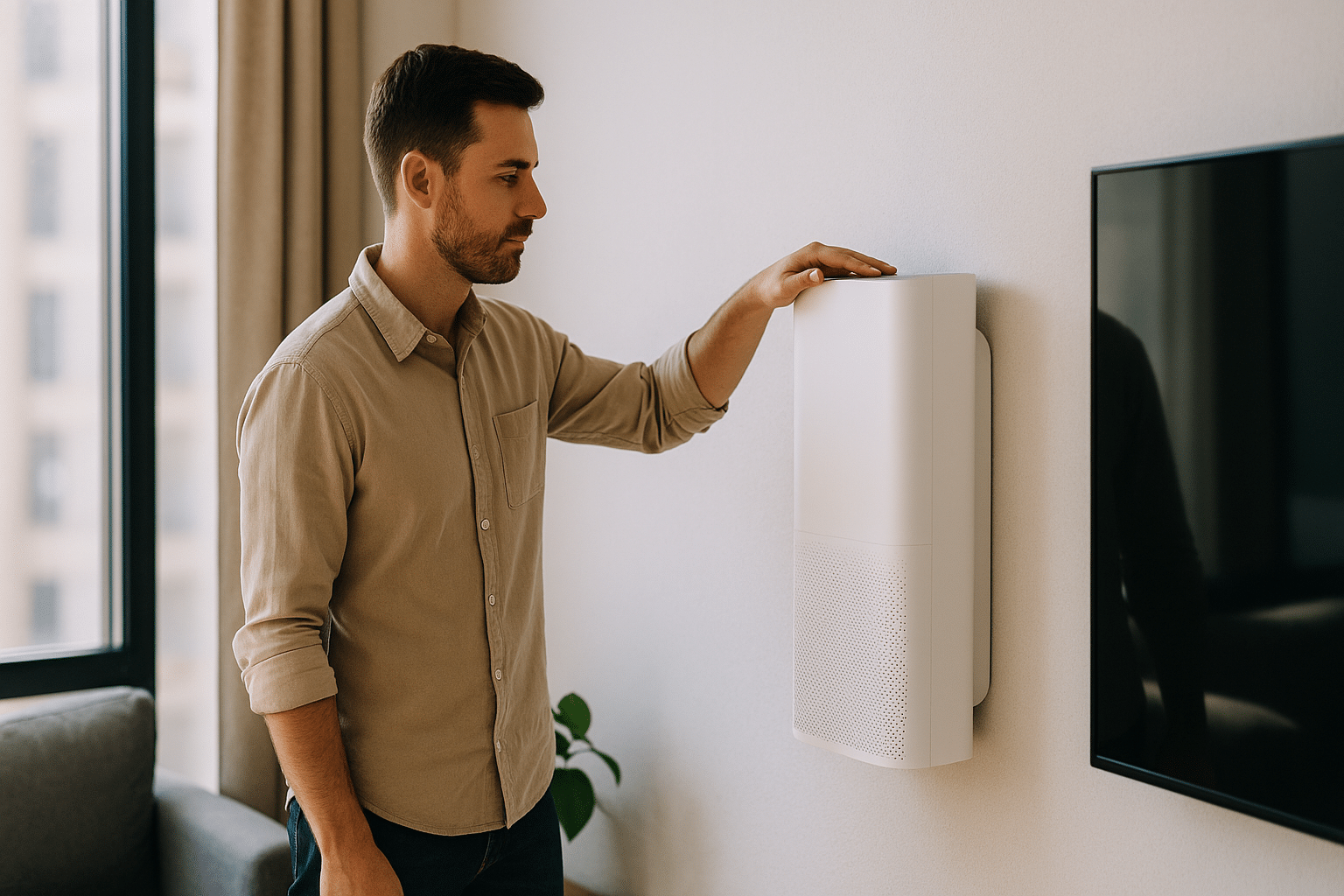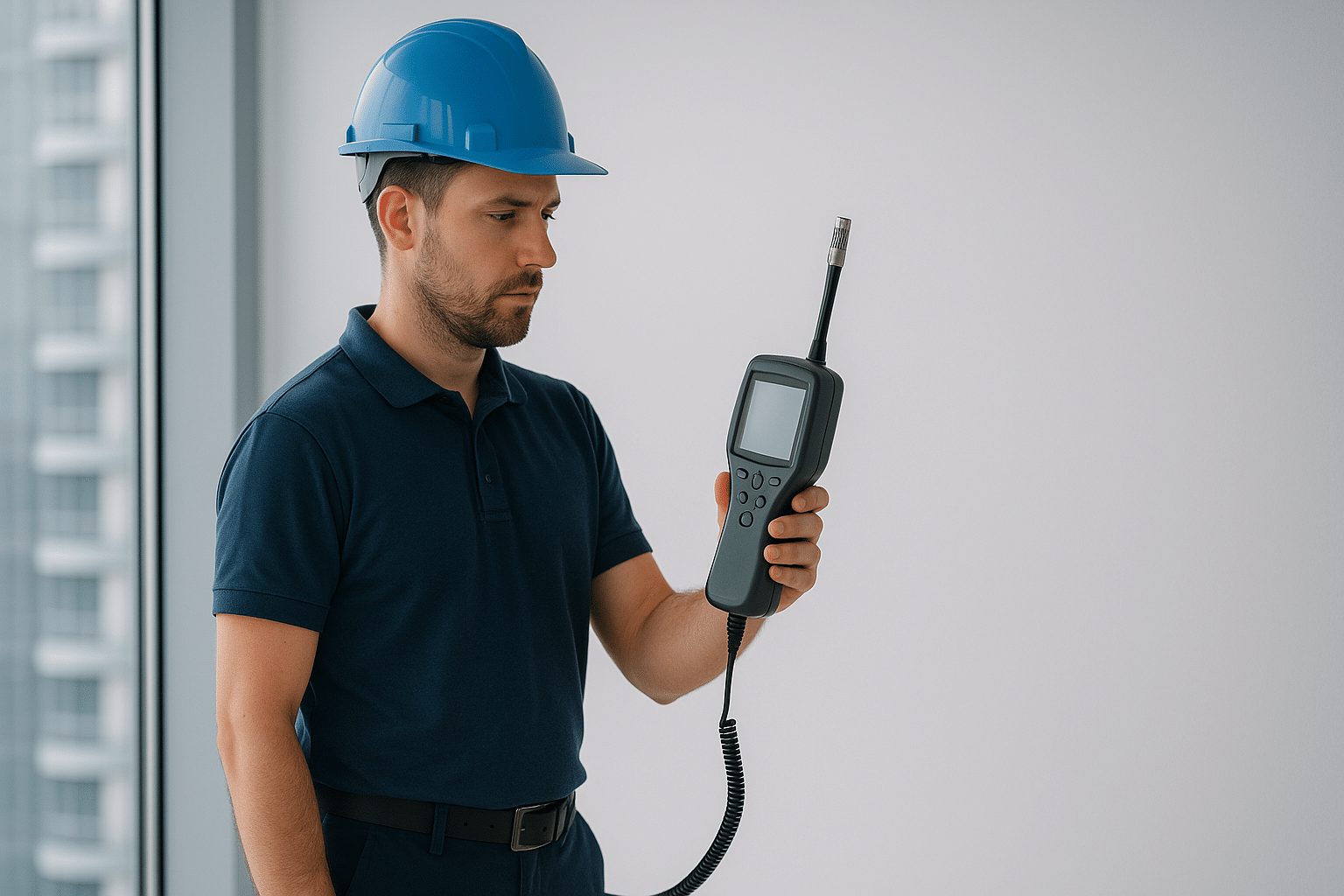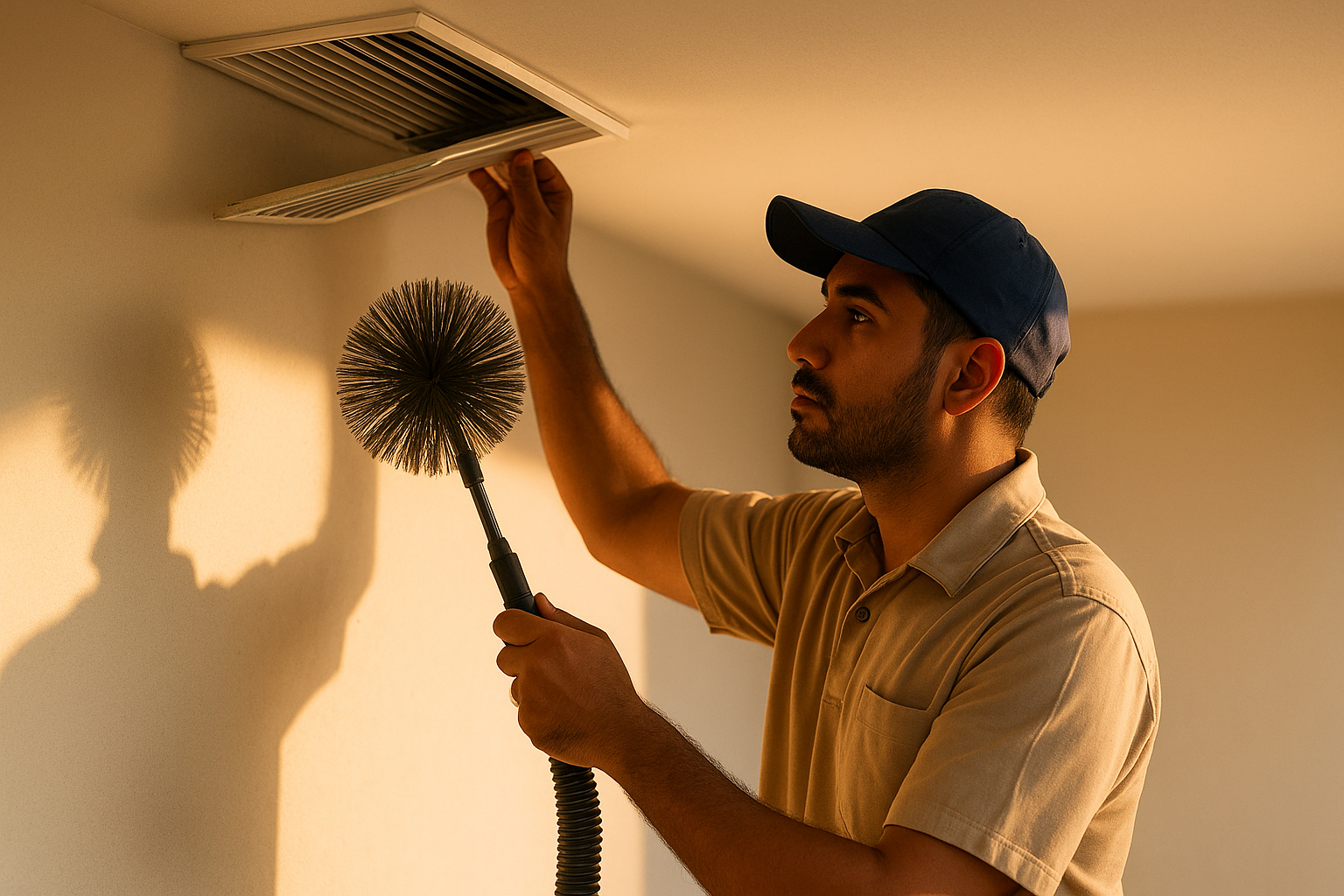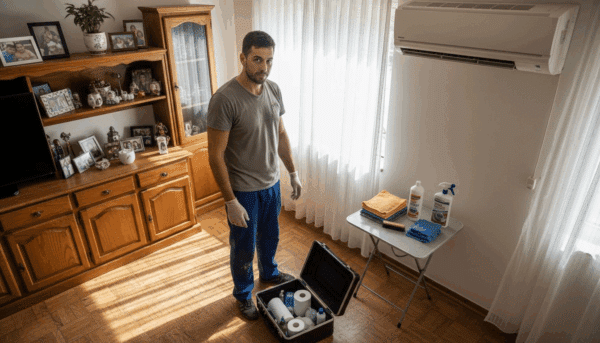
10 Smart Indoor Air Quality Improvement Solutions Dubai Residents Must Know
Table of Contents
Contents
- 1 Table of Contents
- 2 Common Indoor Air Quality Issues in Dubai
- 3 Top Indoor Air Quality Improvement Solutions Dubai
- 3.1 1. Regular HVAC System Inspection and Maintenance
- 3.2 2. Use of HEPA and Activated Carbon Air Filters
- 3.3 3. Introducing Indoor Plants Adapted to Dubai Climate
- 3.4 4. Controlling Humidity Levels
- 3.5 5. Source Control: Choosing Low-Emission Materials
- 3.6 6. Regular Cleaning to Reduce Dust and Allergens
- 3.7 7. Improved Ventilation Practices
- 3.8 8. Deploying Advanced Air Purification Technologies
- 3.9 9. Implementing Workplace and Residential Smoke Controls
- 3.10 10. Routine Indoor Air Quality Testing
- 4 Benefits of Clean Indoor Air in Dubai
- 5 FAQ about Indoor Air Quality Improvement Solutions Dubai
- 5.1 What makes indoor air quality in Dubai different from other cities?
- 5.2 How frequently should HVAC systems be serviced for optimum air quality?
- 5.3 Are air purifiers effective against all indoor pollutants in Dubai?
- 5.4 Can indoor plants significantly improve air quality in Dubai homes?
- 5.5 How do I test indoor air quality in my Dubai property?
- 6 Choosing the Right Service for Air Quality in Dubai
- 7 Conclusion and Call to Action
- 8 Comprehensive Strategies for Indoor Air Quality Improvement Solutions Dubai
- 9 Complementary Measures for Maintaining Healthy Indoor Air
- 10 Conclusion
Common Indoor Air Quality Issues in Dubai
Indoor air quality improvement solutions Dubai are essential given the unique climate and urban environment of Dubai. Residents and businesses alike face specific challenges ranging from dust accumulation to humidity-related mold growth. The city’s rapid development combined with desert surroundings contributes to higher airborne particulate matter indoors and fluctuating humidity levels.
Many buildings in Downtown Dubai, Business Bay, and Dubai Marina experience infiltration of outdoor dust, pollutants from traffic, and irritants like volatile organic compounds (VOCs) emitted by household products and building materials. These factors negatively impact indoor air quality and can cause respiratory discomfort, allergies, and reduce general well-being. Addressing these concerns effectively requires robust indoor air quality improvement solutions Dubai residents can trust.
Notably, the combination of air-conditioned indoor environments and limited ventilation in many Dubai properties can increase the concentration of indoor pollutants. Such issues raise the demand for effective indoor air quality improvement solutions Dubai to ensure safer, healthier living and working spaces.
Top Indoor Air Quality Improvement Solutions Dubai
Effective indoor air quality improvement solutions Dubai combine technology, regular maintenance, and lifestyle adjustments tailored to Dubai’s environmental needs. Below are ten actionable indoor air quality improvement solutions Dubai residents and businesses can adopt for enhancing air quality indoors:
1. Regular HVAC System Inspection and Maintenance
Dubai residents benefit greatly from regular cleaning and servicing of HVAC systems. Well-maintained heating, ventilation, and air conditioning units filter out dust and harmful particles, reducing pollutant recirculation. This is a primary aspect of effective indoor air quality improvement solutions Dubai relies on. Professional companies like Saniservice specialize in HVAC cleaning services focused solely on Dubai, ensuring compliance with local standards such as those recommended by Dubai Municipality.
2. Use of HEPA and Activated Carbon Air Filters
Installing high-efficiency particulate air (HEPA) filters in air purifiers helps capture ultra-fine particles, allergens, and dust common in Dubai’s urban areas. Activated carbon filters also remove odor-causing VOCs and chemical pollutants effectively. Together, they form a robust defense for indoor air sanitization, offering practical indoor air quality improvement solutions Dubai needs.
3. Introducing Indoor Plants Adapted to Dubai Climate
Certain indoor plants naturally purify air by absorbing pollutants and emitting oxygen. Plants like Dracaena, Snake Plant, and Aloe Vera suit indoor Dubai environments due to their resilience to dry air. They not only enhance air quality but also add to interior aesthetics and occupant wellness, making them a natural component of indoor air quality improvement solutions Dubai residents can implement.
4. Controlling Humidity Levels
Maintaining indoor humidity between 40-60% helps eliminate mold growth and reduces dust mite populations common in humid spots like bathrooms or kitchens. In Dubai’s dry climate, using humidifiers or dehumidifiers as needed supports balanced indoor air quality and occupant comfort, forming part of comprehensive indoor air quality improvement solutions Dubai provides.
5. Source Control: Choosing Low-Emission Materials
Minimizing VOCs from paints, adhesives, cleaning products, and furnishings by opting for low-emission or eco-friendly alternatives reduces harmful indoor pollutants. Dubai health authorities encourage awareness around material selections in homes and commercial properties to improve indoor air quality, highlighting key indoor air quality improvement solutions Dubai promotes.
6. Regular Cleaning to Reduce Dust and Allergens
Dust accumulation is a significant contributor to indoor pollution, especially in dust-prone zones like Nad Al Sheba or Arabian Ranches. Frequent vacuuming with HEPA-filtered vacuums, wet dusting, and cleaning air vents lowers particulate buildup and airborne irritants, contributing significantly to indoor air quality improvement solutions Dubai homes require.
7. Improved Ventilation Practices
Dubai homes and offices need balanced ventilation to circulate fresh air inside without letting excessive outdoor dust enter. Using mechanical ventilation systems with filters or opening windows during lower pollution periods encourages healthier indoor environments, as part of comprehensive indoor air quality improvement solutions Dubai offers.
8. Deploying Advanced Air Purification Technologies
Several Dubai-based providers offer air purification units using technologies such as UV germicidal irradiation or ionization to deactivate airborne pathogens and allergens. These methods complement traditional filtration and enhance indoor air quality, especially post-pandemic, representing advanced indoor air quality improvement solutions Dubai households can utilize.
9. Implementing Workplace and Residential Smoke Controls
Controlling secondhand smoke indoors is critical for air quality. Dubai workplaces and residential buildings enforce strict no-smoking policies or designate ventilation-equipped smoking areas to mitigate tobacco-related pollutants, an important part of indoor air quality improvement solutions Dubai mandates.
10. Routine Indoor Air Quality Testing
Periodic air quality assessments identify pollutant sources and measure efficiency of existing solutions. Specialized firms certified by Dubai authorities provide testing that guides targeted interventions and continuous improvement for indoor environments, making it a critical aspect of indoor air quality improvement solutions Dubai offers.
| Solution | Key Benefit | Local Relevance |
|---|---|---|
| HVAC Maintenance | Reduced dust and allergens | Dubai-specific service companies ensure standards |
| HEPA & Carbon Filters | Effective particle and chemical filtration | Targets Dubai’s urban pollution mix |
| Indoor Plants | Natural air purification | Plants tailored to Dubai’s dry climate |
| Humidity Control | Mold prevention and comfort | Balances Dubai indoor microclimates |
Benefits of Clean Indoor Air in Dubai
Investing in indoor air quality improvement solutions Dubai yields significant health, productivity, and economic advantages for residents and businesses.
- Health Enhancements: Cleaner air reduces respiratory diseases, allergies, and asthma triggers, critical in a city where dust storms and high temperatures already stress respiratory health.
- Improved Comfort and Wellbeing: Proper humidity and pollutant control create a more pleasant indoor environment, aiding sleep quality and mental health amidst Dubai’s fast-paced lifestyle.
- Productivity Boosts: Cleaner office air translates to fewer sick days and better cognitive function, helping businesses across Dubai’s commercial hubs maintain efficiency.
- Regulatory Compliance: Meeting Dubai Municipality and DHA air quality standards avoids fines and supports sustainable building certifications.
- Property Value Enhancement: Buildings with certified good air quality attract higher tenant satisfaction and market demand in Dubai’s competitive real estate.
FAQ about Indoor Air Quality Improvement Solutions Dubai
What makes indoor air quality in Dubai different from other cities?
Dubai’s desert environment implies pervasive dust, low rainfall, and high temperatures, creating unique challenges like frequent dust infiltration and need for efficient air-conditioning maintenance to control indoor air quality. These factors underscore the need for tailored indoor air quality improvement solutions Dubai residents can adopt.
How frequently should HVAC systems be serviced for optimum air quality?
It is best to have HVAC inspections every 3 to 6 months in Dubai, depending on use and environmental dust exposure, to maintain filters and duct cleanliness, preventing pollutant buildup.
Are air purifiers effective against all indoor pollutants in Dubai?
High-quality air purifiers with HEPA and activated carbon filters effectively remove many common particles and VOCs, but they should complement other control measures such as ventilation and source reduction. They are a key component of effective indoor air quality improvement solutions Dubai offers.
Can indoor plants significantly improve air quality in Dubai homes?
While indoor plants can reduce certain pollutants, their impact is modest; however, when combined with other solutions, they enhance overall air freshness and indoor environment aesthetics.
How do I test indoor air quality in my Dubai property?
Professional air quality testing services available in Dubai provide measurements of particulate matter, VOCs, humidity, and mold indicators to assess and improve your indoor environment effectively.
Choosing the Right Service for Air Quality in Dubai
Selecting a provider for indoor air quality improvement solutions Dubai requires ensuring the company understands Dubai’s climate and regulatory environment. Providers like Saniservice specialize exclusively in Dubai’s market, offering tailored HVAC cleaning, air filtration system installations, and periodic quality assessments aligned with local Dubai Municipality guidelines.
When evaluating service providers, confirm certifications, customer reviews, and use of advanced technologies compatible with Dubai’s environment. Collaboration with international bodies ensures adherence to global cleaning standards adapted to Dubai’s context.
Conclusion and Call to Action
Indoor air quality improvement solutions Dubai are not just an option but a necessity for comfortable and healthy living and working in the city’s challenging environment. By combining regular maintenance, smart technology, and awareness of local conditions, Dubai residents and businesses can significantly enhance their indoor atmospheres.
Take proactive steps today: schedule HVAC system maintenance, invest in quality air filters, and consult experts to assess and implement customized indoor air quality improvement solutions Dubai.
Clean indoor air is a cornerstone of wellbeing and productivity—start improving yours now!
Comprehensive Strategies for Indoor Air Quality Improvement Solutions Dubai
Ensuring optimal indoor air quality (IAQ) in Dubai’s unique urban environments is essential not only for comfort but also for health and wellbeing. With the city’s fast-paced development and climatic conditions—including high temperatures and frequent dust storms—indoor air pollution can quickly become a significant concern. Fortunately, there are tailored indoor air quality improvement solutions Dubai residents and businesses can implement to create healthier indoor spaces. These comprehensive approaches encompass a range of strategies for effective indoor air quality improvement solutions Dubai needs.
Indoor air pollutants often include dust, allergens, volatile organic compounds (VOCs), smoke, and biological contaminants such as mold or bacteria. In Dubai, where people spend a majority of their time indoors—whether in residential towers in Downtown Dubai or commercial offices in Business Bay—the quality of indoor air directly impacts productivity, respiratory health, and overall quality of life. Dubai Municipality and Dubai Health Authority (DHA) have emphasized the importance of IAQ standards aligned with the UAE Fire & Life Safety Code and local environmental regulations to mitigate these risks.
Advanced Filtration and Ventilation Systems
One of the foundational indoor air quality improvement solutions Dubai relies on is the incorporation of advanced HVAC (heating, ventilation, and air conditioning) systems equipped with high-efficiency air filters and proper ventilation design. These systems are essential to reducing indoor pollutants and controlling humidity levels, which can otherwise exacerbate mold growth and trigger allergies.
Key features in modern systems include HEPA (High-Efficiency Particulate Air) filters capable of trapping up to 99.97% of particles as small as 0.3 microns. Combined with activated carbon filters, they help absorb harmful gases and eliminate odors common in urban Dubai settings, such as vehicle emissions from nearby roads like Sheikh Zayed Road or Air quality affected by desert dust storms.
Another critical component is ventilation that ensures adequate fresh air exchange while maintaining energy efficiency and indoor thermal comfort in hot weather. In Dubai’s commercial buildings and residential complexes in areas like Dubai Marina and Arabian Ranches, mechanical ventilation systems conforming to Dubai Municipality guidelines can significantly reduce the accumulation of indoor pollutants.
Smart Air Quality Monitoring and Control
The rise of smart building technologies has introduced intelligent air quality monitors that provide real-time data on indoor pollutant levels, humidity, temperature, and CO2 concentrations. These monitors can be integrated into building management systems or operate as standalone units to alert occupants when intervention is needed.
For example, smart air purifiers with built-in sensors automatically adjust their filtration intensity based on detected pollutant levels. Such devices are particularly suitable for residential villas in Nad Al Sheba or apartments in Business Bay, ensuring efficient use of energy while maintaining pristine air quality.
Several Dubai-based companies now offer IAQ monitoring as a service, including regular assessments and compliance checks aligned with DHA health advisories. This data-driven approach ensures that indoor environments consistently meet health standards, contributing significantly to indoor air quality improvement solutions Dubai homeowners and businesses can leverage.
Complementary Measures for Maintaining Healthy Indoor Air
While technical interventions form the backbone of solutions, practical lifestyle and maintenance practices play a crucial role in sustaining indoor air quality in Dubai. Long-term improvements come from a combination of professional services and everyday habits tailored to local conditions and regulatory frameworks.
Routine Cleaning and Maintenance Practices
Regular cleaning that targets dust accumulation is essential, especially in Dubai, where desert dust can infiltrate even sealed indoor spaces. Using vacuum cleaners equipped with HEPA filters, wiping surfaces with non-toxic cleaners approved by Dubai Municipality, and promptly addressing signs of moisture buildup can reduce particulate matter and biological contaminants.
Maintenance of HVAC systems, including periodic filter replacement and duct cleaning performed by certified technicians, is also a mandatory practice to avoid recirculating stale or contaminated air. These procedures align with Dubai Municipality’s indoor environmental quality regulations and ensure compliance with sustainability standards encouraged by the Dubai Supreme Council of Energy.
Use of Low-Emission Materials and Products
When renovating or furnishing homes and offices in areas like Downtown Dubai or Dubai Silicon Oasis, selecting materials and products with low VOC emissions contributes significantly to better indoor air quality. Dubai Municipality’s Green Building Regulations encourage the use of environmentally friendly paints, adhesives, and finishes that minimize off-gassing harmful chemicals.
Additionally, incorporating indoor plants known for their air-purifying properties, such as snake plants and pothos, helps naturally filter pollutants and increase oxygen levels. While these plants should not replace mechanical filtration, they provide complementary benefits and enhance the aesthetic and wellbeing aspects of interiors.
Addressing Specific Pollutants Unique to Dubai’s Environment
In Dubai’s dry and dusty climate, particular attention is necessary to control mineral dust and particulate matter infiltrating indoor spaces. Installing entryway mats, using airlocks in commercial settings, and sealing windows and doors properly can help reduce the influx of outdoor dust.
Furthermore, limiting indoor smoking is critical, as tobacco smoke significantly degrades indoor air quality. The Dubai Health Authority enforces strict regulations on smoking in public and shared buildings, supporting better air quality control.
Collaboration with Certified Local IAQ Service Providers
For sustained indoor air quality management, engaging with Dubai-based experts who understand the city’s unique environment and regulatory landscape is vital. Providers specializing in indoor air quality improvement solutions Dubai offer tailored services such as comprehensive audits, customized ventilation upgrades, and ongoing maintenance contracts.
Saniservice, for instance, provides Dubai-exclusive IAQ services, ensuring compliance with all local standards and incorporating Dubai Municipality’s latest environmental guidelines. These collaborations enhance the effectiveness of interventions and help property owners navigate regulatory requirements with confidence. These expert services are crucial for implementing effective and compliant indoor air quality improvement solutions Dubai residents can trust.
Conclusion
Indoor air quality improvement in Dubai demands an integrated approach combining state-of-the-art technology, regulated maintenance practices, and awareness of local environmental factors. With ongoing urbanization and a climate that challenges indoor comfort, investing in specialized ventilation systems, active monitoring, and proper material choices are essential steps for residents and businesses alike.
By following regulatory guidance from Dubai authorities and partnering with credible local providers, indoor spaces across Dubai—whether in lush Arabian Ranches villas or sleek Business Bay offices—can maintain clean, healthy air year-round. These measures not only comply with Dubai’s health and safety codes but also contribute to enhanced wellbeing and productivity, solidifying Dubai’s position as a leader in sustainable urban living in the GCC region.






Leave a Reply